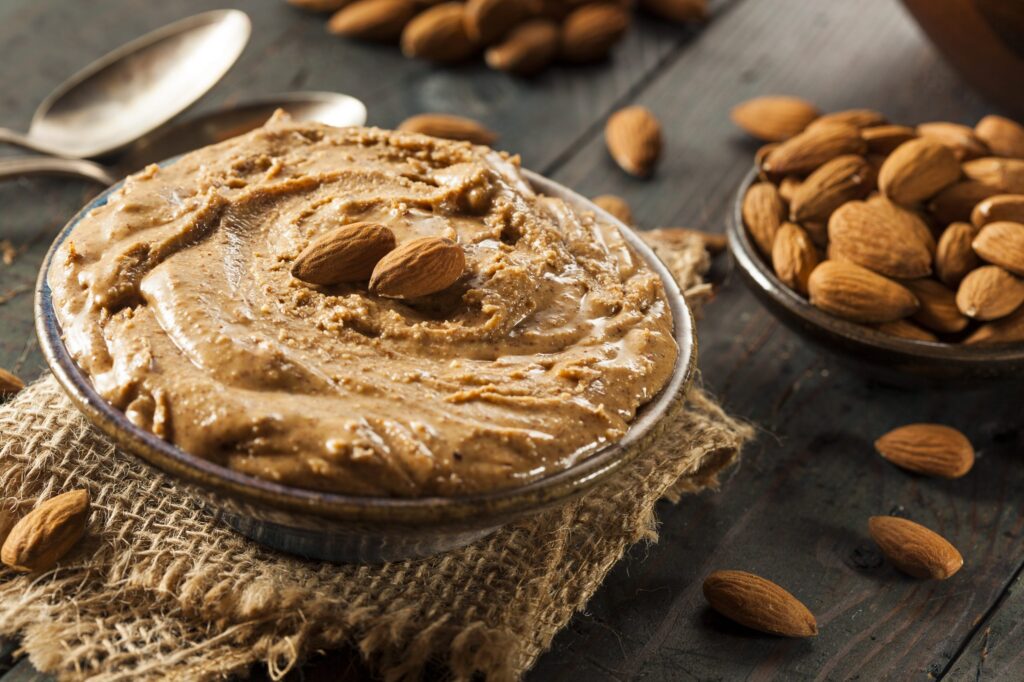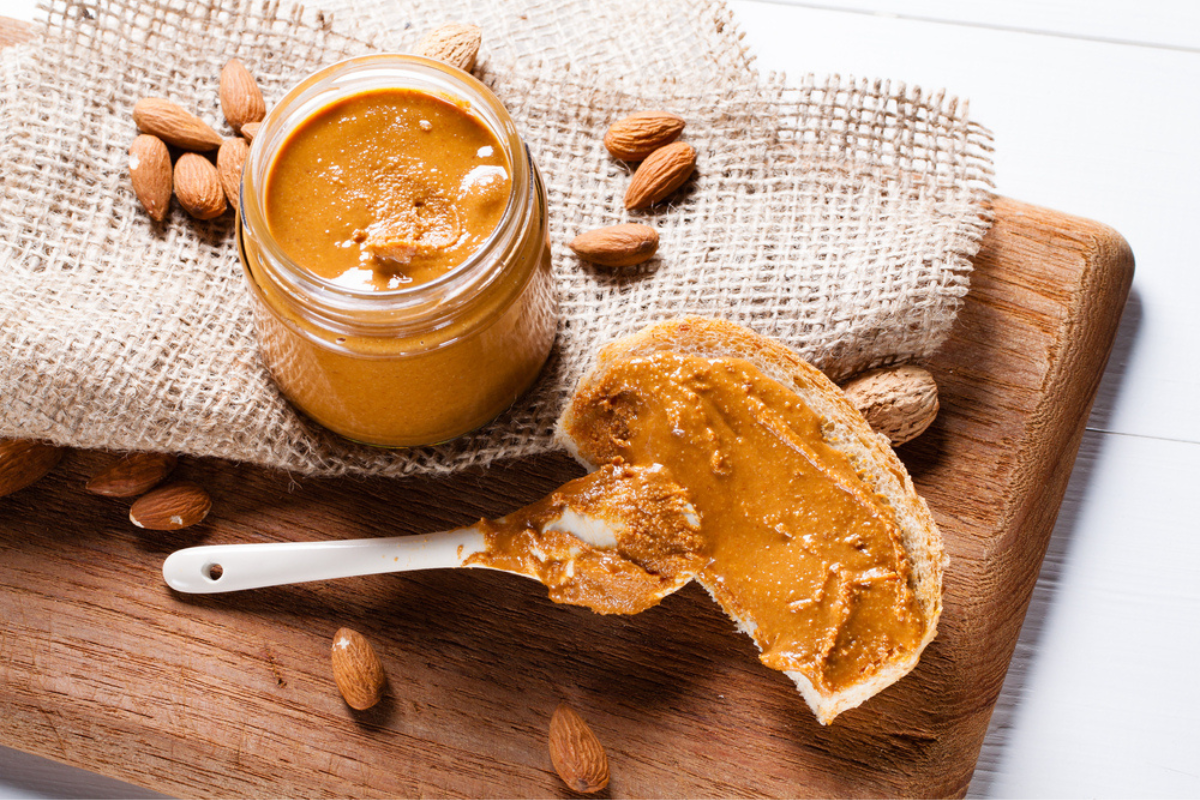Almond butter has become a beloved staple in many kitchens, and for good reason. This creamy, delicious spread is not only a tasty alternative to peanut butter but also a nutritional powerhouse. Packed with healthy fats, protein, vitamins, and minerals, almond butter offers a wide range of health benefits. Whether you’re spreading it on toast, blending it into smoothies, or using it in recipes, almond butter is a versatile and wholesome addition to your diet.
In this blog post, we’ll explore the benefits of almond butter and share creative ways to use it.
What is Almond Butter?
Almond butter is made by grinding roasted or raw almonds into a smooth or crunchy paste. Unlike peanut butter, it has a slightly sweeter, nuttier flavor and a richer texture. Almond butter can be found in most grocery stores, but you can also make it at home with just a food processor and a handful of almonds.
Nutritional Profile of Almond Butter
Almond butter is a nutrient-dense food, offering a variety of essential nutrients, including:
- Healthy Fats: Rich in monounsaturated fats, which support heart health.
- Protein: A good source of plant-based protein, making it ideal for vegetarians and vegans.
- Fiber: Promotes digestive health and keeps you feeling full.
- Vitamin E: A powerful antioxidant that protects cells from damage.
- Magnesium: Supports muscle and nerve function, as well as bone health.
- Calcium: Important for strong bones and teeth.
- Iron: Essential for blood health and energy production.
7 Health Benefits of Almond Butter
1. Supports Heart Health
The monounsaturated fats in almond butter help lower LDL (bad) cholesterol and raise HDL (good) cholesterol, reducing the risk of heart disease. Its magnesium content also supports healthy blood pressure levels.
2. Boosts Energy Levels
Almond butter is a great source of protein and healthy fats, providing sustained energy throughout the day. It’s an excellent snack for athletes or anyone needing a quick energy boost.
3. Promotes Weight Management
Despite being calorie-dense, almond butter can help with weight management. Its combination of protein, fiber, and healthy fats keeps you feeling full and satisfied, reducing the likelihood of overeating.
4. Supports Bone Health
Almond butter is rich in calcium and magnesium, two minerals essential for maintaining strong bones and preventing osteoporosis.
5. Improves Skin Health
The vitamin E in almond butter acts as an antioxidant, protecting the skin from damage caused by free radicals and UV rays. It also helps maintain skin elasticity and hydration.
6. Regulates Blood Sugar Levels
Almond butter has a low glycemic index, meaning it doesn’t cause spikes in blood sugar levels. Its healthy fats and fiber help stabilize blood sugar, making it a great option for people with diabetes.
7. Supports Brain Health
The healthy fats, vitamin E, and antioxidants in almond butter support cognitive function and may help reduce the risk of neurodegenerative diseases like Alzheimer’s.
How to Use Almond Butter
Almond butter is incredibly versatile and can be used in a variety of ways. Here are some ideas to incorporate it into your diet:
1. Spread on Toast or Crackers
Swap out your regular butter or jam for almond butter on toast, bagels, or crackers. Add a drizzle of honey or a sprinkle of chia seeds for extra flavor and nutrition.
2. In Smoothies
Add a tablespoon of almond butter to your morning smoothie for a creamy texture and a boost of protein and healthy fats.
3. As a Dip
Mix almond butter with yogurt, honey, or cinnamon to create a delicious dip for apple slices, banana chunks, or celery sticks.
4. In Baking
Use almond butter as a substitute for peanut butter or regular butter in recipes for cookies, muffins, or energy bars.
5. In Sauces and Dressings
Blend almond butter into sauces or dressings for a rich, nutty flavor. It works well in Asian-inspired dishes, like satay sauce or noodle bowls.
6. Oatmeal or Yogurt Topping
Stir a spoonful of almond butter into your oatmeal or yogurt for added creaminess and flavor. Top with fresh fruit or granola for a complete breakfast.
7. Energy Bites
Combine almond butter with oats, honey, and dark chocolate chips to make no-bake energy bites—a perfect on-the-go snack.
Choosing the Best Almond Butter
When shopping for almond butter, look for options with minimal ingredients—ideally just almonds and maybe a pinch of salt. Avoid brands with added sugars, hydrogenated oils, or preservatives. You can also make your own almond butter at home by blending roasted almonds in a food processor until smooth.
Potential Side Effects and Precautions
While almond butter is generally safe for most people, there are a few things to keep in mind:
- Allergies: If you have a nut allergy, avoid almond butter.
- Calorie Density: Almond butter is high in calories, so enjoy it in moderation if you’re watching your calorie intake.
- Oxalates: Almonds contain oxalates, which can contribute to kidney stones in susceptible individuals.

Almond butter is a delicious and nutritious superfood that offers a wide range of health benefits, from supporting heart health to boosting energy and improving skin health. Its versatility makes it easy to incorporate into your daily meals, whether you’re spreading it on toast, blending it into smoothies, or using it in recipes. Give almond butter a try and discover why it’s a favorite among health enthusiasts!
What’s your favorite way to enjoy almond butter?
Share your ideas and recipes in the comments below!
Disclaimer: This blog post is for informational purposes only and is not intended to replace professional medical advice. Always consult with a healthcare provider before making significant changes to your diet.

